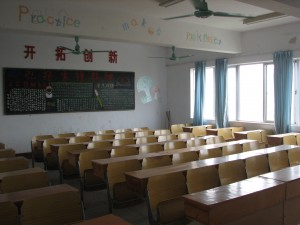The Journey Began
 Reality Laid Somewhere Between Daydreams and Nightmares
Reality Laid Somewhere Between Daydreams and Nightmares
I got out of bed at dawn Wednesday. It had been restless night spent thinking about all the clever things I would say to make students wonder if I was some reincarnated Confucius in disguise. I had spent the last few days losing track of time in a kaleidoscopic tour of Chinese culture and hospitality. And I had spent the nights of that last disorienting week of summer vacation dealing with nightmares about the first day of class. These nightmares had nothing in common with my daydreams. In them I was continuously lost in labyrinthine hallways, losing my books despite fruitless nightlong search and rescue missions, and showing up in class naked. Teachers all over the world were having similar nightmares.
That morning I ran around the campus and fried eggs with cilantro and chilis and cooked oatmeal for breakfast. I listened to a podcast on teaching literature and recited poetry to warm-up my vocal cords. Then I put on my best pressed out clothes, slid into a pair of spit shined brown leather shoes, and double-checked that I had everything I needed to teach my first lesson. I advanced confidently in the direction of my dreams with a book of Tang poetry in both hands, breathing deeply to harness the power of qi for the long day’s journey ahead.
There was the classroom. I saw the students through the doorway awaiting my arrival. This particular classroom was built like an amphitheater. I paused at the threshold, smiled and sounded an authoritative “Good morning†to the four corners of the room. The students smiled and responded in unison, “Good morning, Teacher.†Charmed, I strode to the front podium where an older Chinese lady was already standing.
“Good morning,†she said, “Maybe this is not your class.†Then I saw the black board. “Business English†was written on its surface. I pulled out my schedule and the Chinese teacher glanced at it and she told me that today was Thursday–not Wednesday. And I did not have classes scheduled on Thursdays or Fridays.
I apologized to the teacher and told the class that their teacher reads English better than I do.
I teach seven classes, five of which are literature classes for junior English majors, and two are drama classes for senior English Education majors. Each class is 1 ½ hours long. According to my calculations, this means I teach 10 ½ hours a week. But I could be wrong, since I am an American English major and math is not my forte. On the other hand, legends speak of the Chinese people’s mathematical prowess. This confused me since my contract had said that I will teach 16 hrs, yet the dean told me, as he handed me the schedule, that I would be teaching 14 hours. Maybe the department recognized it would be convenient for me to just teach 10 1/2 hours so that I could spend more time in preparation.  It was a mystery I was content to leave unraveled. In any case, my schedule gave me more free time for extracurricular interaction with the studentry and international diplomacy.
To put all this in perspective, 16-20 “teaching hours” was the standard for public schools. Many private schools, however, were quite different. They contractually required foreigners to work 40 “teaching hours” in the evenings and weekends and put in “mandatory overtime” during peak seasons. These peak seasons occurred during public holidays lasting weeks at a time. And then there was summer break. Obviously, students did not spend their holidays on beach & booze tours in Cancun or backpack trips in Europe. Instead, they went to ESL private schools–which are essentially ESL sweatshops–to learn “oral English” from overworked, stressed out, culture shocked foreign teachers.
I was very thankful for my schedule: Three classes each day on Monday, Tuesday, Wednesday, and then a four day weekend. It was the luck of the draw. Other foriegn teachers worked a couple more hours teaching Oral English, Written English, and Western Culture. The trade off was that these subjects required less preparation, but the teachers worked on other days of the week that may or may not give them a long weekend–but they at least had 1-2 weekdays off in addition to the weekend.
This was the first time Xiangnan University allowed a foreigner to teach juniors or seniors. In the past, according to one source, the provincial government had mandated that upperclassmen could only learn these subjects from Chinese teachers. And this was probably the first time Drama would be taught–at least by a foreigner–at the university. It may even be the first time a drama class was ever taught by a foreigner in China as everybody was so bent up on learning “oral English†or the fine art of saying, “Hello.â€
I was very happy about all this–and it was one of the greatest honors I had ever received. Now I hoped that I would live up to the expectations of the university, the students and both our nations.
